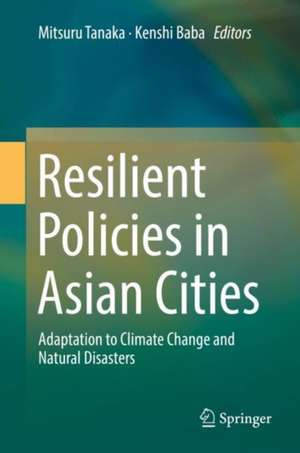Resilient Policies in Asian Cities: Adaptation to Climate Change and Natural Disasters
Editat de Mitsuru Tanaka, Kenshi Babaen Limba Engleză Hardback – 30 aug 2019
Preț: 953.13 lei
Preț vechi: 1162.35 lei
-18% Nou
Puncte Express: 1430
Preț estimativ în valută:
182.40€ • 189.27$ • 152.46£
182.40€ • 189.27$ • 152.46£
Carte disponibilă
Livrare economică 24 februarie-10 martie
Preluare comenzi: 021 569.72.76
Specificații
ISBN-13: 9789811385988
ISBN-10: 981138598X
Pagini: 190
Ilustrații: VIII, 253 p. 69 illus., 32 illus. in color.
Dimensiuni: 155 x 235 mm
Greutate: 0.67 kg
Ediția:1st ed. 2020
Editura: Springer Nature Singapore
Colecția Springer
Locul publicării:Singapore, Singapore
ISBN-10: 981138598X
Pagini: 190
Ilustrații: VIII, 253 p. 69 illus., 32 illus. in color.
Dimensiuni: 155 x 235 mm
Greutate: 0.67 kg
Ediția:1st ed. 2020
Editura: Springer Nature Singapore
Colecția Springer
Locul publicării:Singapore, Singapore
Cuprins
Preface.- PartI Perspectives.- Chapter 1 Policy model; Concept, framework and indicators for resilient policy.- Chapter 2 Assessment of city resilience using urban indicators in Japanese cities.- Chapter 3 Civic indicator: General Public’s Cognitive and Evaluation Structure of Policies for Making City Resilient.- Chapter 4 Civic indicator: The resilience index of regional communities to the risks of disasters .- Chapter 5 Administrative indicators in Japanese cities.- PartII Case studies.- Chapter 6 Application of the policy model in Sendai based on the experience of Sendai Framework for Disaster Risk Reduction Action UNISDR/WCDRR public forum, 2015–2030.- Chapter 7 Multi-criteria Evaluation of Local Energy Resilience.- Chapter 8 Enhancing Capacities for Building Climate and Disaster Resilient Cities in Asia: Case Study of Cebu, Philippines and Nonthaburi, Thailand.- Chapter 9 Strengthening urban resilience / disaster risk management in Asian cities.- Chapter 10 Knowledge Co-Production Processes for Building Disaster- resilience of Communities in Coastal Areas: A Case Study of Baler, Aurora, Philippines.- PartIII Recommendations.- Chapter 11 “Covenant of Mayors Japan”: Regional Re-creation and Global Contributions Through Climate Policy and Energy Autonomy.- Chapter 12 Comprehensive lessons learned and the nest steps.
Notă biografică
Mitsuru Tanaka
Professor
Faculty of Social Sciences
Hosei University
Tokyo, Japan
Kenshi BABA
Professor
Faculty of Environmental Studies
Tokyo City University
Kanagawa, Japan
Professor
Faculty of Social Sciences
Hosei University
Tokyo, Japan
Kenshi BABA
Professor
Faculty of Environmental Studies
Tokyo City University
Kanagawa, Japan
Textul de pe ultima copertă
This book presents a comprehensive framework and indicators that can be used to assess a city’s degree of resilience. Based on surveys using bottom-up assessment tools, it proposes the concept, framework and indicators of a resilient policy model (including some participatory approaches). It also presents case studies of this and similar tools applied to Japanese and Asian cities, the highlights including information not previously available in English. Today, the term “resilience” is prevalent in the context of sustainable societies. The IPCC AR5 published in 2014 again stressed the impact of climate change on natural disasters, while in March 2015 at the World Conference on Disaster Risk Reduction, the United Nations International Strategy of Disaster Reduction (UNISDR) published the Sendai Framework for Disaster Risk Reduction Action 2015-2030 , which serves as a guideline for local governments. Offering transdisciplinary perspectives from fields such as policy science, urban planning, environmental science, social psychology, management development and geography, this book discusses the lessons learned from Asian case studies, explaining the challenges and the effectiveness of the tools, and offering transdisciplinary insights for policymakers.
Caracteristici
Presents a comprehensive framework and indicators that can be used to assess a city’s degree of resilience
Proposes the concept, framework and indicators of a resilient policy model (including some participatory approaches) based on surveys using bottom-up assessment tools
Introduces case studies of the presented and similar tools applied in Japanese and Asian cities
Discusses lessons learned from the cases studies, including the challenges and the effectiveness of the tools
Proposes the concept, framework and indicators of a resilient policy model (including some participatory approaches) based on surveys using bottom-up assessment tools
Introduces case studies of the presented and similar tools applied in Japanese and Asian cities
Discusses lessons learned from the cases studies, including the challenges and the effectiveness of the tools
